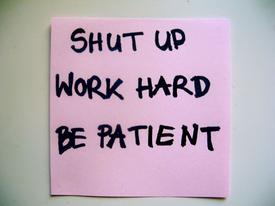Should I worry about too much sodium?

muffintopminx
Posts: 541 Member
I heart salt. And I'm usually always over... by a truck load. I'm just not sure if someone like me even needs to be concerned about it. I'm 35, have super low blood pressure (consistently set off BP alarms whenever I've been in the hospital) and I'm anemic. Is water retention the only thing that would happen to me? Should I delete it from my chart or is it important for me to try to hit the MFP goal?
0
Replies
-
I'm in a similar situation, and would love to know as well!0
-
since you have low BP and anemia your sodium levels should actually be addressed by your physician. Depending on what causes your low BP and what level of anemia you have, you could very well need More sodium then the requirement.
My grandfather puts a rediculous amount of salt on everythign (seriously atleast 1 salt shaker a day) imagine our chock when they tested his sodium and it was LOW0 -
yes you should monitor it, over time you could end up with problems.. i'm a living witness i use to have low presure and all that stuff and now i have high bp and i'm still constantly over but i'm working on itso if you can curb it now do so.0
-
When my father went to the heart doctor, the doctor told him that unless dad was predisposed to heart conditions that my dad could eat all the salt he wanted without heart consequences. That being said, the doctor said nothing about gaining or losing weight.0
-
I thought this was my friend leftymac and jumped all over this one......0
-
Yes you should start worrying about your salt intake--but not only salt but your overall sodium intake. It's not only the salt you shake on foods, but the sodium that comes in processed foods and the sodium that occurs naturally in foods. You may be able to get away with the over salting now--but it will catch up with you. Your body is compensating for the excess sodium--via your kidneys-- you are taking in right now, but it does ultimately increase blood pressure, damage your kidneys and can lead to stroke and heart disease. Here's a little info:
When you regularly add salt to your diet, excess fluid starts to accumulate in the circulatory system because the kidneys cannot excrete all the salt, putting pressure on the walls of blood vessels, raising blood pressure, and overworking the heart. Forcing the heart muscle to pump against this unnaturally raised pressure for many years will cause the heart muscle to enlarge, which often leads to heart failure. That same elevated blood pressure is also the leading cause of stroke
So--your sodium intake should be around 1500mg per day--and if you are looking at prepared foods, the total amount shouldn't exceed 15% of your daily value in that serving of food.
It may easier to start cutting back now at 35, rather than at 40 or 45 when problems start to arise because of the overuse and you're on a no sodium diet. It's your health--easier to look after it now.0
This discussion has been closed.
Categories
- All Categories
- 1.4M Health, Wellness and Goals
- 398.5K Introduce Yourself
- 44.7K Getting Started
- 261K Health and Weight Loss
- 176.4K Food and Nutrition
- 47.7K Recipes
- 233K Fitness and Exercise
- 462 Sleep, Mindfulness and Overall Wellness
- 6.5K Goal: Maintaining Weight
- 8.7K Goal: Gaining Weight and Body Building
- 153.5K Motivation and Support
- 8.4K Challenges
- 1.4K Debate Club
- 96.5K Chit-Chat
- 2.6K Fun and Games
- 4.8K MyFitnessPal Information
- 18 News and Announcements
- 21 MyFitnessPal Academy
- 1.5K Feature Suggestions and Ideas
- 3.2K MyFitnessPal Tech Support Questions





